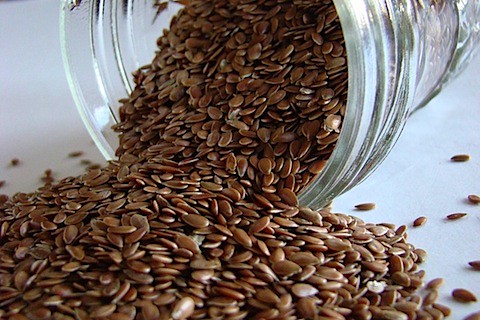Flax Facts

Normally I’d do a Reader Question today, but I was intrigued by the responses to yesterday’s post on Oatmeal Flax Squares.
When Andrew read my post he confessed he didn’t actually like the taste of flax in the squares. What?! Now he tells me! Seems I went too far, too fast. I should have ramped things up gently. Five bucks says I could have slipped in a lesser amount without him noticing. Note to self: Next time use 1/4 cup flax.
Despite this setback, I was pleasantly surprised to see so many of you already use flax on a regular basis and are eager to add it to new dishes. I already put whole seeds in my granola, but your enthusiasm has convinced me to sprinkle some ground flax into my morning yogurt as well. Since I’ve got flax on the brain, I thought I’d go over a few points before retiring the subject:
- Maggie of Dog Hill Kitchen shared the secrets of vegan cupcakes, cookies and breads. Flax can be used as an egg substitute. Just mix 1 tablespoon of flax meal with 2 tablespoons of water and set for 5 minutes until it gels.
- From a nutritional standpoint, ground flax (also called flax meal) is better than the whole seeds. Ground flax is absorbed while seeds can pass through your system undigested if they aren’t chewed properly.
- Ground flaxseed can replace up to 1/4 of the flour in a recipe. However, baked goods won’t rise as much and the final result will be chewier. This is great for rustic breads and hermit-style cookies.
- Ground flax stores for about 90 days in the refrigerator, while whole seeds last up to a year. You’re better off buying whole seeds and grinding them yourself in a blender, food processor or a coffee grinder.
- Brown and golden flax are nutritionally the same. Brown is less expensive in Canada because it’s grown more widely.
As for flaxseed oil? Tried it. Hated it. Plus it goes bad quickly. For my money, there are enough healthy oils out there I don’t need to switch over. Fortunately, you’re better off adding ground flax to your diet since the oil doesn’t contain the cancer-fighting lignans or the fibre.
If you want to know more, the The Flax Council of Canada has facts, recipe, nutritional analysis and pretty pictures.